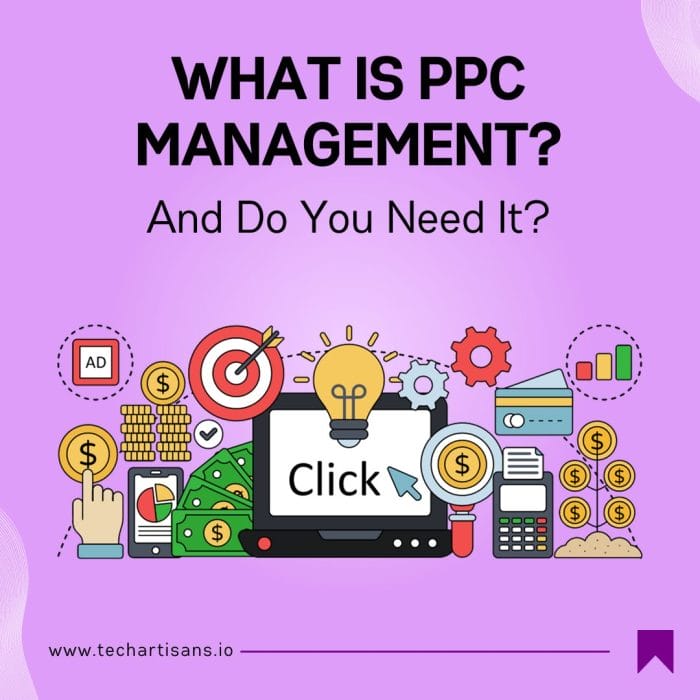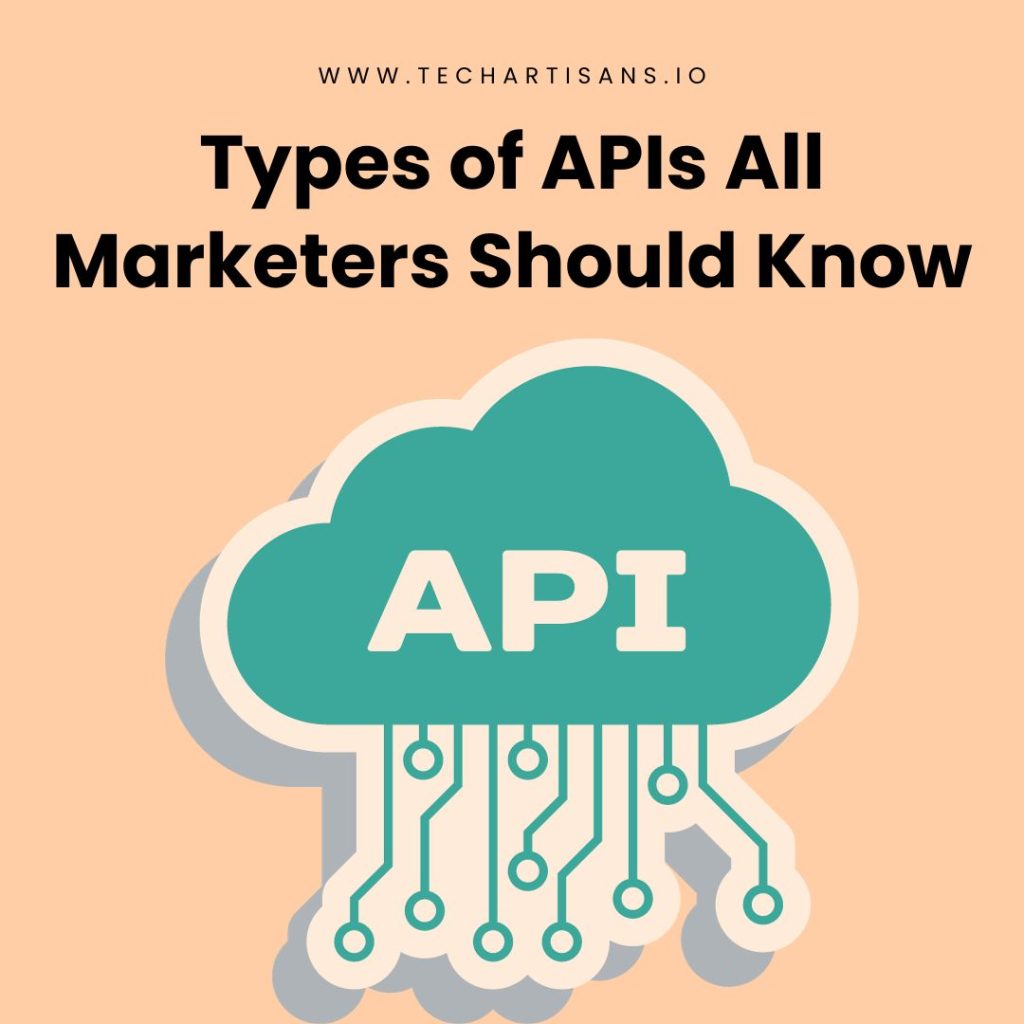Wondering about PPC Management? It’s not just about increasing online traffic; it’s a strategy to turn those clicks into loyal customers. As a small or medium business owner, leveraging PPC management can unlock significant growth potential for your enterprise. Let’s dive into the realm of Management of PPC and uncover how it could transform your business.
What Is PPC Management? (And Do You Need It?)
PPC management is the meticulous process of overseeing and managing a company’s PPC ad spend. This often entails strategizing, setting up, and running campaigns to ensure that all advertising endeavors are optimized for maximum profitability.
1. Monitoring PPC Campaigns

PPC Management involves continuous monitoring of PPC campaigns to ensure they perform optimally. This includes keeping an eye on metrics like click-through rates, which are crucial in understanding your campaign’s performance. For more insights, check out our guide on PPC analysis and tips.
2. Optimizing PPC Strategies

Optimization in PPC management entails tweaking and refining your PPC advertising strategies to amplify their effectiveness. This could involve keyword optimization, improving ad copy, or adjusting bids based on performance data to maximize return on ad spend (ROAS), similar to the strategies outlined in our SEO principles and fundamentals article.
3. Making Improvements to PPC Campaigns

PPC Management means making proactive improvements to your PPC campaigns. This might involve expanding on successful strategies, cutting underperforming keywords, or testing new ad formats. The goal is to continuously enhance your PPC campaigns to yield the best possible results for your business.
Read Digital Marketing Kickstart: Finding Your Starting Point
Difference Between SEO and PPC Management

While SEO and PPC Management are integral parts of digital marketing, they operate differently, each with unique strengths. Let’s delve into the contrasts between these two powerful strategies and how they can complement each other in a comprehensive marketing plan. To better understand this difference, explore our article on the basics of SEO and its impact on businesses.
1. SEO in Online Visibility

Search Engine Optimization (SEO) is vital in expanding your online presence. It focuses on enhancing your website’s organic ranking on search engine result pages (SERPs). The goal is to make your site more attractive to search engines using keyword optimization, high-quality content creation, and link-building techniques. The result is Increased visibility, more organic traffic, and improved chances of converting visitors into customers.
2. PPC in Online Visibility

Pay-per-click (PPC) advertising is a strategy that involves purchasing ads that appear on the top of SERPs ahead of organic results. With PPC, you pay every time a visitor clicks on your ad. The advantage? Immediate visibility on the first page and potential for faster return on investment.
3. SEO and PPC: A Complementary Duo

While SEO and PPC Management play distinct roles, they complement each other excellently in a comprehensive digital marketing strategy. SEO builds a foundation for long-term growth, while PPC can deliver immediate results.
Importance of PPC Management

As we delve into the importance of PPC Management, let’s uncover how this strategic tool can significantly influence your business’s trajectory. To understand the broader scope of PPC and its impact, our comprehensive guide on digital marketing trends can provide more context.
1. Successful Ad Campaigns

PPC management is essential for successful ad campaigns as it optimizes ad spend and aligns strategies with business goals. It involves detailed keyword analysis and continuous monitoring to maximize ad effectiveness and long-term competitiveness.
2. Nature of PPC optimization

The ongoing nature of PPC optimization is a testament to its dynamic character. It’s an iterative process that requires consistent monitoring, testing, and refining of campaigns to maintain optimal performance. As market conditions fluctuate and consumer behaviors evolve, PPC optimization helps ensure your campaigns stay relevant, effective, and profitable.
Tips for Successful PPC Campaign Management

Let’s delve into the essential tips that pave the way for successful PPC campaign management. For additional insights, consider our article on web design and SEO user experience, which highlights the importance of a cohesive strategy.
1. Regular Maintenance

Regular maintenance is an essential aspect of successful PPC Management. It involves routinely monitoring your campaigns to ensure they perform optimally and align with your business goals. This includes checking for variations, reviewing keyword effectiveness, and adjusting ad copy. Consistent maintenance helps identify any issues early on, allowing for timely adjustments and optimizing your campaigns for success.
2. Bid Adjustments

Bid adjustments are a crucial part of PPC Management that can significantly influence your ad performance. It involves strategically adjusting your bids based on device, location, time, and demographics. This allows you to maximize your ad spend on high-performing segments while cutting back on areas not yielding expected returns.
3. Split-Testing

Split-testing, also known as A/B testing, is a method used to compare two versions of an ad to see which performs better. You can test elements like headlines, body text, calls to action, or images. The data gathered from these tests helps you make informed decisions, improve your ad performance, and boost your conversion rates.
4. Use of Smart Bidding

Smart Bidding, a subset of automated bidding, uses machine learning to optimize your bids for conversion value in every auction. This feature automatically adjusts your bids based on many factors, such as device, location, time of day, etc. Smart Bidding can free up your split testing, reduce manual labor, and improve the performance of your campaigns by capitalizing on Google’s advanced machine-learning algorithms.
Benefits of Effective PPC Management

Let’s explore the numerous benefits of implementing a well-managed PPC strategy.
1. Enhancing Brand Visibility

Efficient PPC Management enhances brand visibility by positioning ads prominently on search engine result pages, building credibility, and expanding reach. Additionally, it supports multichannel strategies, reaching potential customers on various digital platforms for broader audience reach and higher conversions.
2. Appearing for Relevant Events

Effective PPC Management enables your business to appear in search results for relevant events or popular trends, increasing visibility during peak times. This targeted approach ensures your ads reach potential customers who are actively interested in your product or service, increasing engagement and conversion rates.
3. Assisting in Keyword Research

PPC Management assists in keyword research by identifying your business’s most relevant and profitable keywords. This process ensures your ads target users who are most likely to be interested in your offerings, increasing your ads’ effectiveness and, ultimately, driving higher returns on your ad spend.
4. Quick Ranking for Keywords

PPC Management aids in quick ranking for keywords, providing an immediate visibility boost. Unlike SEO, which may take months to rank, PPC ads can get top placement as soon as they go live. This means business appears prominently in search results for targeted keywords, driving instant traffic and potential conversions.
5. Testing and Understanding Audiences

PPC Management facilitates testing and understanding of your target audience. Analyzing audience behavior allows you to tailor your ads to resonate better with your potential customers. This enables you to connect effectively with your audience, improving engagement and enhancing your campaign’s overall success.
6. Generating Warm Leads

PPC Management is instrumental in generating warm leads, individuals who have already shown interest in your product or service. By targeting these prospects with customized ads, businesses can nurture these leads further down the sales funnel, increasing the likelihood of conversions and boosting return on investment.
Common PPC Management Mistakes to Avoid

Avoiding common mistakes in PPC Management is crucial for ensuring your campaign’s success and maximizing your return on investment. Avoiding these mistakes is crucial, much like understanding the common web security vulnerabilities to protect your online presence.
1. Improper Location Settings

One of the common mistakes in PPC management is needing to correctly set your ads’ locations. This can lead to your ads being served to users in areas where your business might need to operate or deliver, wasting your ad budget. Customizing your ad reach based on your service areas is essential to ensure that you target the right audience and maximize your return on investment.
2. Operating on Low Budgets
Operating on lower budgets might seem like a cost-saving strategy initially, but it may block the performance of your PPC campaigns in the long run. A low budget may not allow your ads to compete effectively in the market, leading to lower visibility and fewer conversions.
3. Inadequate Conversion Tracking

Another common mistake is not implementing proper conversion tracking. Conversion tracking helps you understand which keywords and ads drive valuable customer actions. With accurate tracking, you can determine your campaigns’ effectiveness and spend your budget on non-performing ads.
Special Considerations for E-commerce PPC Management

E-commerce PPC Management poses unique challenges and opportunities requiring a specialized approach to maximize online visibility and conversions. For e-commerce specifically, our piece on the most common e-commerce mistakes could offer additional insights.
1. Dos of Ecommerce PPC Management

- Invest in High-Quality Product Images: Visuals influence purchase decisions for e-commerce businesses. Always use high-quality, clear images for your product ads to capture user interest and show your products in their best light.
- Optimize Product Titles and Descriptions: Ensure your product titles and descriptions are optimized with relevant keywords. This can help your ads rank higher in search results and attract more potential customers.
- Leverage Shopping Ads: Make the most of Shopping Ads, which display product images, prices, and merchant names directly within search results. They can significantly improve click-through rates and conversions for e-commerce businesses.
2. Don’ts of Ecommerce PPC Management

- Neglecting Mobile Users: With the rise in mobile commerce, paying attention to mobile users can result in lost opportunities. Ensure your ads and website are mobile-optimized to provide a seamless shopping experience on all devices.
- Ignore Negative Keywords: Negative keywords prevent your ads from showing on irrelevant searches. Ignoring them can lead to unnecessary ad spending. Regularly update your negative keyword list to improve your PPC campaign’s efficiency.
- Skip A/B Testing: Never skip A/B testing when running PPC campaigns. Testing different ad elements can provide valuable insights into what works best for your target audience, enabling you to optimize your campaigns for better results.
Advantages of Using PPC Management Software

To understand how technology can aid in marketing strategies, our article on the benefits of using Agile methodology is a great resource.
Here we discuss different Advantages of Using PPC Management Software:
1. Automation

PPC Management Software simplifies managing multiple ad campaigns, making it less boring and time-consuming. This software automates bid adjustments, keyword research, and ad placement, freeing your time to focus on strategic initiatives. This automation also increases the efficiency and effectiveness of your PPC campaigns.
2. Robust Reporting

These tools offer comprehensive reporting features that provide critical insights into key metrics like click-through rates, conversion rates, and cost per click. You can generate detailed reports, which are invaluable in evaluating campaign performance, identifying trends, and making data-driven decisions.
3. Insights for Better PPC Management

When to Consider Partnering with a PPC Management Agency

Deciding when to partner with a PPC Management Agency is a crucial decision that can significantly impact your business’s digital marketing success.
1. Overwhelmed by The Complexity of PPC

The first sign that you might need to partner with a PPC Management Agency is feeling overwhelmed by the complexity of managing PPC campaigns. PPC involves many moving parts: keyword research, ad creation, bid management, conversion tracking, and regular optimization. If working on all these elements feels daunting, consider professional help.
2. Insufficient Results Despite Efforts

It could signal the need for expert assistance if you have been running PPC campaigns but are still waiting to see the desired results despite significant efforts and investment. A professional PPC agency has the experience and expertise to analyze your campaigns, identify areas of improvement, and implement effective strategies to enhance your ROI.
3. Scaling Your Business

Managing PPC in-house can become increasingly challenging as your business grows and you look to scale your campaigns. Partnering with a PPC agency can help you manage the growing complexity and ensure your campaigns continue to deliver results.
Benefits of Hiring a PPC Management Agency

Let’s delve into the manifold benefits of hiring a professional PPC Management Agency.
1. Access to Expertise

PPC agencies are experts in their field. By partnering with them, you gain access to their knowledge and experience, which can significantly improve your campaign performance and ROI.
2. Saving Time and Resources

Managing PPC campaigns can be time-consuming. By outsourcing this task, you can save time and resources that can be better spent focusing on your core business areas.
Expected Timeline for PPC Results

Business owners must understand and set realistic expectations for PPC campaign results.
1. Immediate Traffic, Not Immediate Conversions

PPC advertising offers the advantage of immediate traffic. Your ads will appear in search results once your campaign is live. However, direct traffic only sometimes translates into quick conversions. It may take some time before you start seeing a significant increase in leads or sales.
2. Data Collection and Optimization
The initial weeks of a PPC campaign are often focused on data collection. These insights are invaluable for optimizing your campaign. After a month or so, with appropriate tweaks and adjustments based on the data collected, you can expect a better performance from your PPC campaign.
3. Long Term Results

PPC management is a long-term strategy. While some results can be seen relatively quickly, achieving the full potential of PPC advertising often takes several months of continuous testing, optimization, and refining.
Overview of PPC Management Services and Cost

PPC Management Services offers a range of solutions to help elevate your digital marketing efforts, but these services come at varying costs, which are essential to understand for effective budgeting.
1. Services

PPC management agencies primarily provide account audits, keyword research, ad creation, landing page optimization, bid management, conversion tracking, and ongoing optimization.
Account Audits:

Agencies review your existing campaigns to identify areas of improvement and develop strategies to enhance performance.
Keyword Research:

Conducting thorough keyword research to identify profitable opportunities and avoid costly mistakes is essential for PPC success.
Ad Creation:

They create compelling, get-optimized ad copies that attract and persuade potential customers to click on your ads.
Landing Page Optimization:

Agencies ensure their campaigns’ success and identify improvement areas. Landing pages are well-designed and optimized for conversions, providing a seamless experience.
Bid Management:

They manage your bids to ensure you get the most out of your advertising budget.
Conversion Tracking:

Agencies implement and monitor conversion tracking to determine their campaigns’ success and identify improvement areas.
Ongoing Optimization:

They land regular reviews and make necessary adjustments to ensure your campaigns continue to deliver optimal results.
2. Typical Cost Structures of PPC Management

The cost of PPC management can vary vastly depending on the agency and the scope of services. It typically includes a setup fee and a monthly management fee. The setup fee usually ranges from $500 to $2,500, while the monthly management fee can be a flat fee or a percentage of your ad spend (typically between 10% and 20%). Some agencies may also offer performance-based pricing tied to the results achieved. Always clarify the cost structure before engaging a PPC management agency to avoid unexpected costs.
Conclusion
Effective PPC management is critical to any successful digital marketing strategy. It provides a scalable solution for businesses to reach potential customers, drive traffic, and convert that traffic into leads or sales.
Partnering with a PPC management agency can offer substantial benefits for small to medium-sized businesses, including access to expertise and time-saving. Remember that PPC advertising can generate immediate traffic, and sustained success relies on ongoing optimization. With the right strategies, PPC can yield a substantial return on investment, promoting growth and profitability for your business.
For further reading on optimizing your online strategy, our guide on the future of SEO and coming trends offers valuable insights.







